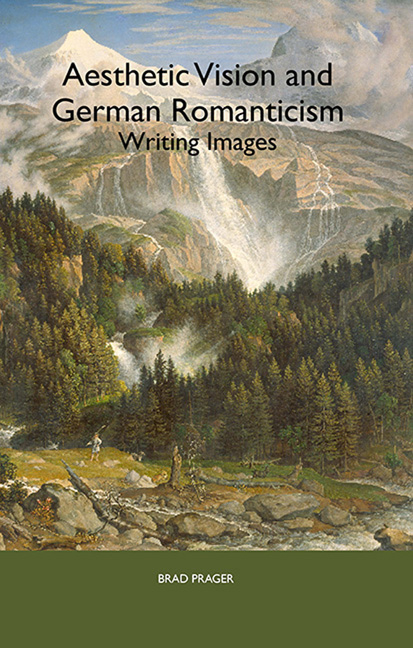Book contents
- Frontmatter
- Contents
- List of Illustrations
- Acknowledgments
- Introduction
- 1 Interior and Exterior: G. E. Lessing's Laocoon as a Prelude to Romanticism
- 2 Image and Phantasm: Wackenroder's Herzensergießungen eines kunstliebenden Klosterbruders, Tieck's Franz Sternbalds Wanderungen, and the Emergence of the Romantic Paradigm
- 3 Symbol and Allegory: Clemens Brentano's Godwi
- 4 Sublimity and Beauty: Caspar David Friedrich and Joseph Anton Koch
- 5 Light and Dark: The Paintings of Philipp Otto Runge
- 6 Absolution and Contradiction: Confrontations with Art in Heinrich von Kleist's “Die heilige Cäcilie oder Die Gewalt der Musik” and “Der Findling”
- 7 Self and Other: Joseph von Eichendorff's Das Marmorbild
- Conclusion
- Notes
- Works Cited
- Index
Conclusion
Published online by Cambridge University Press: 13 April 2017
- Frontmatter
- Contents
- List of Illustrations
- Acknowledgments
- Introduction
- 1 Interior and Exterior: G. E. Lessing's Laocoon as a Prelude to Romanticism
- 2 Image and Phantasm: Wackenroder's Herzensergießungen eines kunstliebenden Klosterbruders, Tieck's Franz Sternbalds Wanderungen, and the Emergence of the Romantic Paradigm
- 3 Symbol and Allegory: Clemens Brentano's Godwi
- 4 Sublimity and Beauty: Caspar David Friedrich and Joseph Anton Koch
- 5 Light and Dark: The Paintings of Philipp Otto Runge
- 6 Absolution and Contradiction: Confrontations with Art in Heinrich von Kleist's “Die heilige Cäcilie oder Die Gewalt der Musik” and “Der Findling”
- 7 Self and Other: Joseph von Eichendorff's Das Marmorbild
- Conclusion
- Notes
- Works Cited
- Index
Summary
In the preceding chapters I have studied a range of literary and visual works representing a variety of Romantic encounters with art that shed light on the relationship between the real world and the space of the imagination as it was conceived around 1800. These examples have served to paint a fuller picture, so to speak, of what I consider a major turning point in the construction of the modern subject, particularly in relation to aesthetic experience. The critics and artists associated with this period opened a space we still inhabit; the contradictions they confronted have not yet been resolved.
As suggested by this last assertion, I intended this study to cover more than merely historical terrain. In tracing a broad path through Romantic art and writing, on one level my research was indeed meant to focus on a specific era and to represent the elucidation of a singular moment in the history of ideas. On another level, however, I hoped to make claims that would extend beyond the scope of the moment under consideration. This is what I intended when I stated, in my introductory remarks, that I aspired to a philosophical approach — one that renders the texts in question philosophical — rather than an approach concerned with reconstructing the philosophy of the Romantics. Such a project has value, but the philosophical claims made in these pages were also meant to address the endless interplay between visual perception and the constitution of the subject.
To begin at the historical level, I have focused on aspects of the period of German cultural history that can be described as Romanticism, with an emphasis on the literary and visual production associated with that term. I have taken the primary texts selected to be grounded, in part, in the history of philosophy, focusing on Kant as a precursor, an influence, and a catalyst. I considered his work at some length in the introduction and returned to him throughout this study because his Critiques represent a transformation in thought, his work being a watershed. In language that I have adopted, Lacoue-Labarthe and Nancy have referred to a “crisis” inspired by the Critiques, and they have equated Kant's intervention with the late eighteenth-century crisis of the bourgeoisie as well as with the French Revolution.
- Type
- Chapter
- Information
- Aesthetic Vision and German RomanticismWriting Images, pp. 226 - 230Publisher: Boydell & BrewerPrint publication year: 2007



